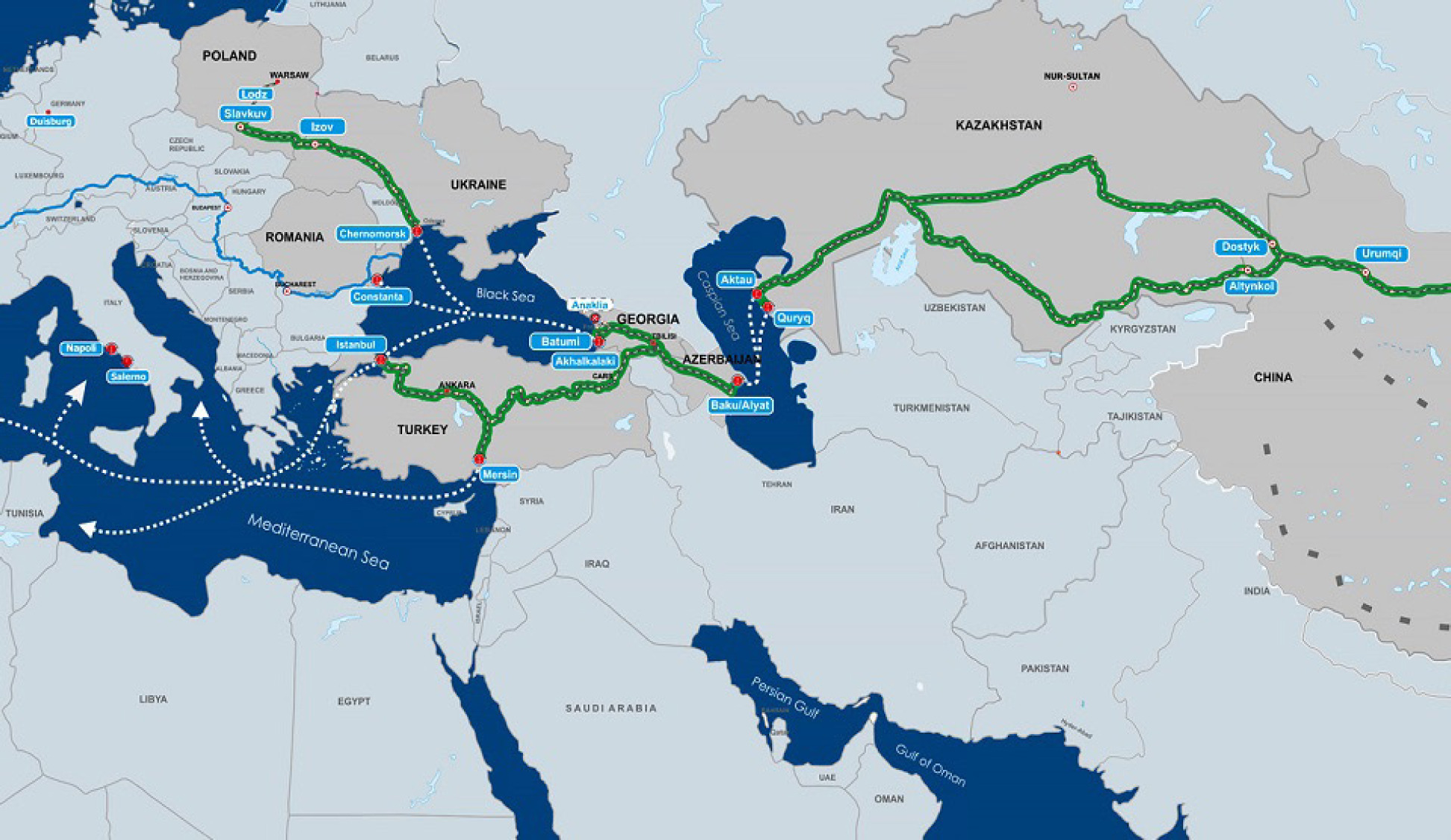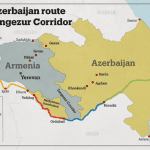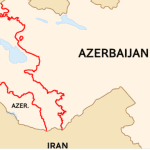Apparently nobody wants to address the deeper geo-political struggle behind the Nagorno-Karabakh conflict, now flared up again and invading the front pages world-wide. A decades-long story about a localized enclave in a deeply isolated zone – how can it have wider ramifications in terms of the global power balance? How can it affect, say, China or Europe or the Mideast? Seems fanciful but what happens between Armenia and Azerbaijan, even specifically the control over mountainous Karabakh, does potentially shift far-flung inter-continental alignments. Only the neighboring countries talk about that – if they choose to. Some don’t because it’s the elephant in the room. This column is not about the historical grievances or human rights outrages of the Karabakh conflict. Those are important but exhaustively covered elsewhere. What you don’t see anywhere is a proper look at the superpower stakes hidden in the geography.
Take a close look at the map of Karabakh, an outcrop of the Caucasus mountains inside Azerbaijan that, in maximal extent, reaches far enough south to touch the border with Iran. Logistically whoever controls the Karabakh heights in Azerbaijan potentially dominates that sensitive stretch of border, which offers a clue to the decades-long bloodshed. Now this part of the argument cannot advance without some serious attention to geographical detail. We’ll call it the tale of two corridors. First, the Zangezur Corridor. Along that Iran-Azerbaijan border zone, overlooked by Karabakh’s mountains, runs the putative ‘Zangezur Corridor’. The corridor then goes across a sliver of Armenian territory, thereby directly connects Azerbaijan to Turkey – a long cut-off connection which the two Turkic countries aim to restore. Here’s an article about the Zangezur project. The Iranians are against it. The Armenians are against it. Moscow used to oppose it. Why is it so important? Answer: because the ‘Zangezur Corridor’ is potentially the last leg of a much longer north-south route called the ‘Middle Corridor‘ that would connect Central Asia’s Turkic republics to Turkey proper via Azerbaijan. We’re talking a rail and road lifeline, and various fuel pipelines, that can revive the ancient Silk Road trade route which Moscow cut off two centuries ago under the Czars.
As this column never tires of saying, Ukraine aside, Central Asia is the next big thing geostrategically, now that the Afghan war is over. We covered the momentous Biden meeting with Presidents of the ‘Stans at the recent UNGA, a forum entitled C5+1. We are talking about Turkmenistan, Uzbekistan, Kazakhstan, Kyrgyzstan, Tajikistan aka the C5. Currently that entire bloc is effectively hemmed in by Russia, China, Iran etc.. Currently, the C5 ‘Stans need to go through those tampon countries to reach the world, to sell raw materials which include strategic amounts of gold, gas, oil and the like. But once you add Azerbaijan and Turkey geographically, the implicit blockade is broken. That’s where the “Middle Corridor” comes in, avoiding regional superpowers and linking from Central Asia down to the Zangezur Corridor thereby creating a direct highway between the Turkic countries (and their natural resources) to the outside world. That is to say, the five ‘Stans, Caspian Sea, Azerbaijan, Turkey and beyond. The Armenians are the only geo-obstacle. That’s how the Soviets planned the borders, so that a whole slew of countries were mutually opposed and landlocked except via Russia. With Karabakh no longer a tactical threat, the Turkic artery is one step closer to completion.
But, of course, even more critical than carving out an independent trade route, the new link-up would create a cultural and identity resurgence of ‘Pan-Turkism’, a bonding solidarity that – having remained dormant for centuries – changes the power calculations right across Asia. If the Turkic bloc begins to gel and act in concert, a new threat emerges to Iran, Russia, China, not to mention Armenia. In China, the Uyghur Turks would feel emboldened. In Russia, numerous Turkic regions from Tatarstan to Buryatia might start seceding. Iran, above all, would feel the threat as the population of its own Azerbaijan province would want to unite with their cousins to the north who have a country of their own. Turkic solidarity is why Turkish President Erdogan, in the teeth of global criticism, has just visited Baku to congratulate Azerbaijani president Aliyev for his ‘victory’ in Karabakh. Here is a highly informative article by a top regional journalist, Amberin Zaman, about that visit and its context. She mentions the Zangezur Corridor.
To many in the West, the idea of ‘Pan-Turkism’ may seem remote or fanciful but to the region’s surrounding countries there’s an ancient ancestral memory of the phenomenon, a fear of the Tatar hordes or the Hun or invading tribes of horsemen from Attila to Timur. That’s why China built the Great Wall. Russians, for example have defined much of their historical identity on absorbing, repelling and subduing the phenomenon and thereby saving Christendom. Hence ‘Holy Mother Russia’ and hence the Czars as ’emissaries of God’. Under that mission, for centuries Moscow has felt justified in imposing hegemony not just over their Muslims but also over all nearby Christian populations, from Armenians and Georgians to Ukrainians. Russians cannot understand, after all the ‘protecting’ they’ve done, why such populations should want to escape Russian control. Didn’t they protect the population of Ukraine from the Crimean Tatars in the 18th century? Hence Putin’s visceral sense of outrage whenever any near-abroad country prefers to join the West. And not just Putin, but much of the Russian population, who are genuinely blind to Moscow’s history of slaughter in the name of protection.
Why, then, didn’t Putin protect Armenia against Azerbaijan in the recent Karabakh debacle? Why has he taken the latter’s side? It’s a multiplex calculation. As Amberin Zaman notes in her article, Armenia’s President Pashinyan is a ‘color revolution’ people-power democrat, the worst kind of threat to Putin’s own power especially if it gets going inside Russia. He prefers to deal with autocrats like Aliyev, Erdogan, and Ivanishvili in Georgia. Then there’s the oil calculation. According to Amberin Zaman, Azerbaijan helps Putin evade sanctions by selling Russian oil as Baku’s oil. Especially through Turkey via the Baku-Tbilisi-Ceyhan pipeline. Ultimately, the Kremlin believes it can best control the Turkic countries by colluding with post-Soviet type leaders and systems to mutually create top-down wealth. China, equally, calculates that it can do the same by helping forge the ‘Middle Corridor’ via Beijing’s ‘Belt-and-Road Initiative’ even though that would break the Russia-China-Iran blockade. Like Russian oil flowing via Baku, Chinese goods would flow through Central Asia to the world and the Turkic republics would be economically dependent on Beijing.https://1ed79f16d8af2ece6bbd191d3d24c9a8.safeframe.googlesyndication.com/safeframe/1-0-40/html/container.html?n=0
That, then, is the Moscow-Beijing calculation. But it’s a tricky one, that could lose control very quickly. Most commentators argue that both Azerbaijan and Armenia will soon kick out Russian peacekeepers. As this column has often argued, the Central Asian C5 republics are gradually democratizing, expanding economically and bonding together very intentionally to avoid new kinds of dependence on nearby hegemons. Hence their meeting with President Biden. Add to that the enthusiasm of Western oil companies for alternate pipelines, and you’ve got a sizable momentum. A large part of their hopes pivot on the Turkey-Azerbaijan link along Iran’s border and across Armenian land. Karabakh was but is no longer an impediment to the Zangezur corridor.
By: Melik Kaylan
Source: Forbes



